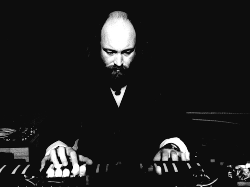
This is the Future Sound of London
Electronic music project, created on a probably foggy day, in Manchester, UK, around mid eighties, by a couple of friends: Brian Dougans and Garry Cobain.
Along the history of the band, the duo has maintained a really discrete and mysterious way of handling the media and their audience.
Although they’re usually labeled as ambient, their music has denied every attempt on inserting them into a specific genre. They surf from unique ambient manifestations through tribal rhythms, spiritual atmospheres, ludic evolution and psychedelic sonoric expansion. Along their carrier Dougans and Cobain have shown different lines of deep exploration, resulting in a colorful cocktail of sounds and moods. Their search has included different areas, including 2D and 3D computer animations, experimental radio broadcast, video and film.
Famous for their finesse in remixing and samplings, this duo has remixed works of Robert Fripp, Curve and David Sylvian.
Amorphous Androgynous, Art Science Technology, Humanoid, Intelligent Communication, Mental Cube, Q, Semi real, Yupie and Yage, are only some of their aliases.
“People are gradually realizing, ‘Actually I’ll make less money, take more risks, have more faith, sell my house, move out of London, work for different people, find different people, then discover ‘My God, life’s a trip, My God, life’s exciting, My God how did I ever accept the prison walls.’ That’s what it’s all about. I don’t need massive amounts of money, to be honest; I live very simply. At those points when people threaten my freedom of expression, I just say goodbye and go with people that love what I do. Personal truth will not harm me in the long run.”
In the last years, this bright couple of sonic explorers has shown a deep attraction towards Psychedelia, a stronger presence of organic and ethnic elements characterizes their latest work.
"Psychedelia is about escaping from our adult cells and getting back to a childlike perspective on life, possibility, joy, fun...celebration, really. I think there was a period when electronic music was really a way out, it was [about] breaking lots of rules, and then it's just became a set of rules..."
These are some of FSOL’s most significant works:
Stakker '92 (as Humanoid) (1992)
Accelerator (1992)
Earthbeat (early releases using several aliases) (1992)
Tales of Ephidrina (as Amorphous Androgynous) (1993)
Cascade (1993)
The Far-Out Son of Lung and the Ramblings of a Madman (1994)
Lifeforms (feat. Elizabeth Fraser) (1994)
Dead Cities (1996)
Papua New Guinea (2001)
The Isness (as Amorphous Androgynous) (2002)
Alice In Ultraland (as Amorphous Androgynous) (2005)
“Life and every aspect of it is even more amazing, the more aware you are; to breathe and fuck, whatever you want consciously becomes the most amazing thing.”
Because of their “one step ahead” musical philosophy and their sensitive codification sampling, pointed towards the creation of mystical sonic paths, the river sounds on the Future Sound of London.
Electronic music project, created on a probably foggy day, in Manchester, UK, around mid eighties, by a couple of friends: Brian Dougans and Garry Cobain.
Along the history of the band, the duo has maintained a really discrete and mysterious way of handling the media and their audience.
Although they’re usually labeled as ambient, their music has denied every attempt on inserting them into a specific genre. They surf from unique ambient manifestations through tribal rhythms, spiritual atmospheres, ludic evolution and psychedelic sonoric expansion. Along their carrier Dougans and Cobain have shown different lines of deep exploration, resulting in a colorful cocktail of sounds and moods. Their search has included different areas, including 2D and 3D computer animations, experimental radio broadcast, video and film.
Famous for their finesse in remixing and samplings, this duo has remixed works of Robert Fripp, Curve and David Sylvian.
Amorphous Androgynous, Art Science Technology, Humanoid, Intelligent Communication, Mental Cube, Q, Semi real, Yupie and Yage, are only some of their aliases.
“People are gradually realizing, ‘Actually I’ll make less money, take more risks, have more faith, sell my house, move out of London, work for different people, find different people, then discover ‘My God, life’s a trip, My God, life’s exciting, My God how did I ever accept the prison walls.’ That’s what it’s all about. I don’t need massive amounts of money, to be honest; I live very simply. At those points when people threaten my freedom of expression, I just say goodbye and go with people that love what I do. Personal truth will not harm me in the long run.”
In the last years, this bright couple of sonic explorers has shown a deep attraction towards Psychedelia, a stronger presence of organic and ethnic elements characterizes their latest work.
"Psychedelia is about escaping from our adult cells and getting back to a childlike perspective on life, possibility, joy, fun...celebration, really. I think there was a period when electronic music was really a way out, it was [about] breaking lots of rules, and then it's just became a set of rules..."
These are some of FSOL’s most significant works:
Stakker '92 (as Humanoid) (1992)
Accelerator (1992)
Earthbeat (early releases using several aliases) (1992)
Tales of Ephidrina (as Amorphous Androgynous) (1993)
Cascade (1993)
The Far-Out Son of Lung and the Ramblings of a Madman (1994)
Lifeforms (feat. Elizabeth Fraser) (1994)
Dead Cities (1996)
Papua New Guinea (2001)
The Isness (as Amorphous Androgynous) (2002)
Alice In Ultraland (as Amorphous Androgynous) (2005)
“Life and every aspect of it is even more amazing, the more aware you are; to breathe and fuck, whatever you want consciously becomes the most amazing thing.”
Because of their “one step ahead” musical philosophy and their sensitive codification sampling, pointed towards the creation of mystical sonic paths, the river sounds on the Future Sound of London.
.

